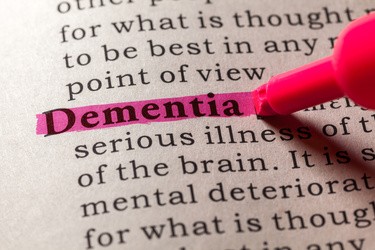
According to the Alzheimer’s Association International Conference 2021, from 1999-2019, there was an astonishing 88 percent increase in the U.S. mortality rate from Alzheimer’s. Globally, there are more than 350,000 new cases of early onset (prior to age 65) dementia per year, and that number continues to grow.
Digital Discussion on Dementia
Positive Aging Sourcebook hosts weekly Digital Discussions on a diverse array of positive aging topics. These free events bring together senior-serving professionals, older adults, and family members to discuss important and timely aging topics.
During Sourcebook’s recent Digital Discussion on Early Onset Dementia, we welcomed Lindsey Vajpeyi, the director of early-stage dementia programs at Insight Memory Care Center in Fairfax, Va. Below are the audience’s questions and Lindsey’s answers, edited for length and clarity.
Questions, Answers, Resources
Q: Can you define the distinct levels of cognitive impairment?
Lindsey: Yes! Dementia is a very general word that we use to describes changes in cognition that are more severe than what would be considered normal aging. Dementia interferes with daily life. It’s not forgetting your keys once in a while; it’s consistently forgetting dates or having trouble completing daily tasks.
Alzheimer’s is the most common form of dementia, but there are other lesser-known types. There is also mild cognitive impairment, or MCI, which is the middle of the road between normal aging and dementia. People with MCI have some cognitive changes that are identifiable by professional testing, but they are still able to complete daily tasks—they may just need more time.
Q: If I think mom (or dad) has some form of dementia, what should I do? Where do I start?
Lindsey: You will want to determine if this is just a normal part of aging or if it is dementia or mild cognitive impairment. The first step is to schedule a visit with your loved one’s primary care physician. While this might eventually lead to a referral to a neurologist, the primary care physician is the best place to start, and they will review everything from blood work to medication interactions to determine what is really happening. They will rule out other possibilities before they start to look at dementia or Alzheimer’s.
Q: Are there free or low-cost resources for family caregivers who are providing care on a limited budget or without insurance coverage?
Lindsey: There actually are some options. At Insight Memory Care Center, we provide consultations free of charge to anybody, anywhere. We are a nonprofit adult day health and resource center focusing on Alzheimer’s disease and other memory impairments. Beyond free consultations, Insight also has lots of resources available on our website at insightmcc.org.
The Alzheimer’s Association provides a wealth of information free of charge at alz.org. They host support groups as well. In Northern Virginia, Elderlink provides free consultations and can help you learn more about local resources.
If you are not local, you should visit Eldercare Locator at eldercare.acl.gov to find resources anywhere in the country. Likewise, no matter where you or your loved one live, contact your local Area Agency on Aging for resources.
Adult day care is a crucial resource for family caregivers. Most counties offer some form of adult day care for older adults with dementia. Families contribute to the cost of care on a sliding scale. Independent non-profit organizations like Insight also offer financial assistance to help cover the costs of adult day care for low-income families.
Q: How do I monitor my own behavior?
Lindsey: I think one of the most important things anyone can do is to start a conversation with their doctors and the people they interact with on a regular basis. Let people around you know that you want to hear from them if they are seeing something that concerns them.
Q: What is the one thing you wish care partners or those with a recent Alzheimer’s diagnosis knew?
Lindsey: Most of all, I wish families and individuals with a diagnosis knew to start asking questions and talking sooner. I hear so often from families that they wish they had known about a program or resource years ago. Many families wish they had talked more to Dad about how he wanted to be cared for while he was still capable of having the conversation. So, my words of wisdom are really: start talking and keep talking. These conversations will be uncomfortable, but they need to happen before they can’t happen.
An interactive discussion with Lindsey Vajpeyi Early-Stage Program Director at Insight Memory Care Center. This discussion that will dive into the changes that occur in early-stage...
Posted by Positive Aging SourceBook on 03/18/2022
Gain valuable insight from a pioneer in the development of memory clinics and co-author of the award-winning book, Brain Health as You Age: A Practical Guide to Maintenance and PreventionDr....
Posted by Positive Aging SourceBook on 05/18/2022
Alzheimer's is a global health problem with over 6 million living with the disease in the US. Tremendous gains have been made in the understanding of the science and basic biology...
Posted by Positive Aging SourceBook on 10/14/2021
A live and interactive discussion with the team from RAZ Mobility who have created an innovative one-touch dial picture cell phone that is designed specifically for individuals with...
Posted by Positive Aging SourceBook on 01/14/2021
effectively communicating and caring for others versus caring for ourselves. What are the differences, who needs to know and why do we need to know? Empathy is essentially meeting...
Posted by Positive Aging SourceBook on 11/06/2020
CURRENT ISSUE
State of MD-DC-VACURRENT ISSUE
PA-NJ-DE